NEW DIRECTION FOR COMMUNITY POWER AND ACTION

Introduction
A Year of
Change
Change
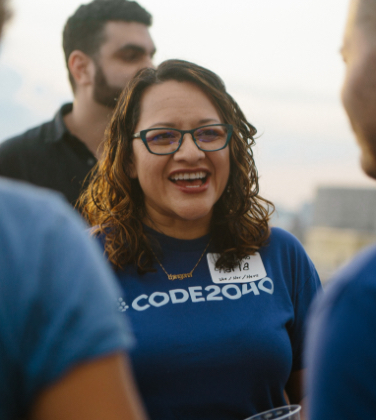
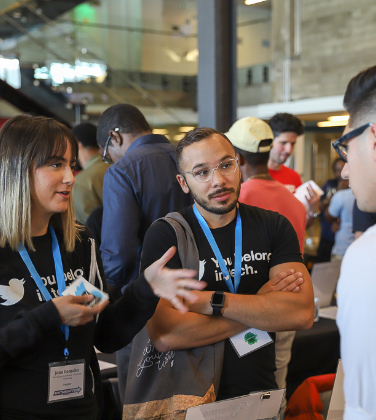

All of this took place with one purpose in mind: to ensure that our community has the connections, resources, and care it needs to advocate for and achieve racial equity in tech.
And they couldn’t come at a more pressing time. After listening and learning over the past seven years, it became clear that the key to proportional representation of Black and Latinx individuals in the innovation economy is to empower people to take action wherever they are.
In an economy shaped by the digital revolution, access to tech isn’t just about access to jobs—it’s about access to power.
We had to ask ourselves: how do we dismantle the structural barriers to racial equity?
The answer: Harnessing the collective power of our community.
This annual report captures our journey and impact through a year of change, and the people like you who have supported us along the way as we shift the landscape of the tech industry.
Letter from the CEO
Dear Community,
Several times last year, it felt like we were jumping into the unknown.
While we had our eyes on the horizon, a view of what an equitable and just industry could look like, we didn’t always know the path forward. But we stood strong because we knew it was the right thing to do.
Jumping meant abandoning old models, practices, and ideas about what it would mean to bring about racial equity in the tech industry. It meant we would no longer partner with companies that were not making commitments to structural change. It meant that we were reimagining our programs to ensure participants became advocates. It meant we were no longer going to philanthropically subsidize the HR departments of multi-billion dollar valuation tech companies.
But with jumping comes learning. What we learned was the power of our community.
You charged in to see if there were ways that you could help. Whether that was facilitating introductions, advocating for us in your companies, being a sounding board, or just the simple act of having faith, you were there. I will never forget sitting in Tierra Mia Coffee in Oakland as a community member said to me, “We will carry water for you, you just tell us what we need to do.” That moment and so many others demonstrated to us that the power of this organization rests in you and that we should be investing in the leadership of this community.
It is the tireless work of our staff and community that you will see reflected in this annual report. These results close out one chapter of our work and open up a new one. We believe that by 2025, 10% of the industry will be managed, mentored, trained, and/or organized by you. We hope you see yourself reflected here, and we look forward to the next leg of path-breaking together.
In community,
A new direction
CHANGING SYSTEMS AND CHANGING OURSELVES
NEW MISSION AND VISION

2040 is the beginning of the decade when the United States will be majority Black and Latinx. Meanwhile, tech is radically transforming how we interact with money, information, and each other.
Given these changes, access to tech is not just about access to jobs but access to power.
In the summer of 2018, we realized that if we were going to ensure Black and Latinx people were proportionally represented in tech, we needed to think beyond pipeline change and focus on systemic change. We needed to prioritize community mobilization.
We worked hard with our staff and community to develop a new vision, mission, and strategic plan that we believe will get us closer to proportional representation—and keep our community at the center of our work.
So, may we present our new mission and vision:

Mission
To activate, connect, and mobilize the largest racial equity community in tech to dismantle the structural barriers that prevent the full participation and leadership of Black and Latinx people in the innovation economy
Vision
The equitable distribution of power in an economy shaped by the digital revolution
Through management, mentorship, training, and organizing, this community will impact 100,000 people — 10% of the entire tech industry — and shift the landscape of tech across the country.
This helps us achieve our larger vision to impact the equitable distribution of power in an economy shaped by the digital revolution. Through events, trainings, early-career programs, and knowledge-sharing, we will equip Black and Latinx technologists and their allies with the tools, connections, and care they need to advocate for and achieve racial equity in the tech industry.
FOUR PATHWAYS TO 100,000 PEOPLE
Pathway
Deepen and expand racial equity in tech by advocating for proportional representation of Black and Latinx people in the industry.
This means
- Expanding the set of players who can discuss and strategize for racial equity in the tech sector.
- Building coalitions that address power and issues in a way that deploys our community effectively.
- Catalyzing the transformation of Black and Latinx technologists into advocates for change.
Pathway
Build tools and resources for skill and capacity building so that our community can operationalize change.
This means
- Providing our community with the tools needed to succeed and foster the success of Black and Latinx people in tech.
- Providing our companies with frameworks, goals, and language to support industry transformation.
Pathway
Advance racial equity movements to support Black and Latinx achievement in the industry.
This means
- Supporting our community by raising the bar of acceptable discourse for racial equity in tech.
- Creating coalitions with multiple organizations to craft and support industry-wide agendas for change.
Pathway
Build an organization that reflects a healthy relationship with the intentions, tensions, and aspirations we have for our work in the external world.
This means
- Understanding the tradeoffs and choices that need to be made in search of operational equity and share our learnings with our community.
- Wrestling with the equitable distribution of power.
- Becoming more sustainable both financially and operationally over time.
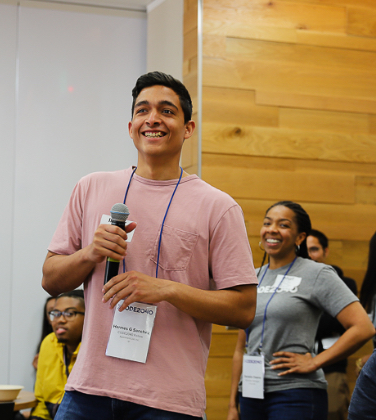
New Values
When we wrote our Pillars on Race in 2017, our goal was to share the operating principles that define Code2040’s approach to race and our work. With our shift in mission toward building a movement for racial equity, it became clear that our pillars on race were the beliefs that grounded what our values should be, guiding how we interact with each other and our community.
Community Mobilization
We believe that action is required and we all have a role to play, together. As a growing movement of Black and Latinx technologists, their allies, and fellow advocates, we care for each other, celebrate each other, actively bring in others, and take on the work of remaking the industry to be equitable and inclusive.
Compassionate Accountability
We believe all people and systems can change and that speaking truth to power is critical for that change to occur. We lovingly but firmly hold others and ourselves accountable for centering Black and Latinx experiences, naming and dismantling oppressive systems, and creating the processes and cultures required to ensure Black and Latinx people thrive in tech.


Innovation
Structural racism is our enemy, and we know what it takes to create structural change. We are constantly testing new approaches, spotting patterns, and sharing knowledge that will transform the industry. In working with hundreds of technologists, companies, universities, and others, we’re learning what’s working and what’s not.
Distribution of Power
We reject the zero-sum view of power and resources that say, “If you are getting something, this must mean I am not.” In contrast, we believe that by applying the gifts and talents of ALL people, intentionally deploying the ardent sponsorship of allies, and engaging in a consistent inspection of structural and personal beliefs, we will better be able to grow the pie to the benefit of all people.
Multiple Truths
Reality is complex and nuanced. We understand that forward movement means making difficult tradeoffs, but that there is room at the table for the complexity of our shared experiences. We hold the multiple truths of the data we collect and the experiences of our community at the center of our ideas, knowing both are required and valid.
Impact
Transformative experiences that drive change
Early career programs

Fellows Program
The Fellows Program is an intensive career accelerator for Black and Latinx college and graduate-level computer science students. For nine weeks between June and August, students intern at a top tech company and participate in a series of learning experiences designed to give them the tools and resources needed to navigate and change the tech industry. As they engage in racial equity advocacy work in a much more intimate setting, they learn about what’s happening in the industry, what systems need to change, and what their roles are as racial equity advocates. They build community with other Black and Latinx technologists and receive support from mentors and managers, while redefining the future and face of tech and ensuring other technologists like them have the opportunity to succeed in the innovation economy.
2018 had the largest class of Fellows in three locations, including our first time in New York City and with 72 company partners.
| Know at least two Black or Latinx technologists employed in full-time technical roles | 66% | 92% |
| Fully understand or can teach how to engage in general technical problem solving | 30% | 51% |
| Fully understand or can teach software debugging | 26% | 44% |
The impact of the Fellows Program extends far beyond the summer and technical work. Within a few months of finishing the program, participants report greater involvement in racial equity learning and engagement.
| Attended talks from leaders in the racial equity space in the last year | 28% | 58% |
| Took university courses that explore racial and economic inequality in the last year | 37% | 46% |
| Fully understand or can confidently teach the difference between equity and diversity initiatives | 31% | 66% |
Tech Trek
Tech Trek is an immersive career-prep experience for Black and Latinx computer science majors. It’s designed to address the key factors in the retention and persistence of Black and Latinx computer science/engineering majors on the path to becoming thriving technologists and leaders in the innovation economy. The program also provides real-time data to tech companies.
In 2018, we hosted 50 Tech Trekkies.
| Had a group of peers with whom they can share struggles in computer science | 62% | 96% |
| Felt they had opportunities to be mentored by technologists who looked like them | 30% | 87% |
| Felt confident they would earn a CS degree | 89% | 96% |
| Felt confident in navigating issues of race and identity in the workplace | 38% | 98% |
| Felt they knew how to advocate for themselves, their education, and their career | 51% | 93% |
ECAP
The Early Career Accelerator Program (ECAP) is geared toward Black and Latinx tech professionals in the beginning of their careers. Participants received socio-emotional, professional, and management development through in-person workshops, mentorship and coaching, and online engagement.
In 2018, our inaugural year of the program hosted by Slack, we saw extraordinary gains in the confidence of attendees.
| Felt empowered and had the tools needed to provide feedback to their manager and colleagues | 26% | 94% |
| Felt a sense of belonging at their workplace | 42% | 82% |
| Felt confident in their role at work | 68% | 88% |
| Knew how to plan out and advance their careers | 16% | 94% |
Events
With events, we’re creating engaging spaces for connection and change. We launched two new event series in 2018 while continuing to grow our signature event, The Summit.
Popups
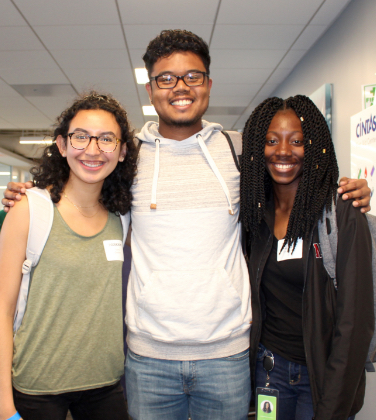
About
PopUps are stand-alone events designed to engage a broader community of participants, particularly rising Black and Latinx tech professionals, through conversation-based programming, like panels. These PopUps are hosted by trusted, mission-aligned company partners, scaling Code2040’s ability to create unique spaces for Black and Latinx experiences across the industry.
In 2018, we partnered with CircleCI to produce our first PopUp, a panel addressing the topic of “Getting Ahead.” This panel included stories and strategies about keeping skills up to date, deciding when to join or leave a company, taking financial risks and planning for financial uncertainty, developing sponsorship and strategic self-advocacy, and more.
Salons

About
Salons are intimate spaces for insightful, casual dialogue to happen among community members on topics pertaining to diversity, equity, and inclusion in the innovation economy.
Imagine a dining table with 15–20 brilliant, passionate, and curious individuals from a variety of tech, racial, and gender backgrounds coming together over food and conversation to dream, laugh, disagree respectfully, and be intrigued about the most pressing issues facing our industry. In 2018, we hosted a racial equity salon in our space for DEI professionals.
The Summit
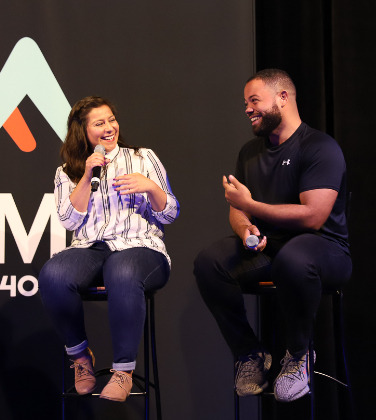
About
The Summit is our signature annual event that equips participants with the tools, resources, and community they need to advocate for racial equity in the industry.
Building and advocating for diversity and inclusion in a non-diverse industry comes with various challenges and barriers. The Summit creates a space for exploring, understanding, and overcoming those challenges
In 2018, we sold more than 700 tickets to The Summit and engaged participants and community members from over 100 tech companies and organizations.
In 2019, we’re experimenting with creating event spaces that seek to break the isolation of being Black and Latinx in tech. We’re focused on hosting fun, accessible events that give our community an opportunity to meet and create strong relationships through film screenings, dinners, and more. To better meet our community’s needs, we shortened the structure of The Summit from two days to one. The conference will include all the joy and connection that folks have come to expect—original content, space to heal and build community, great food—all wrapped into one full day of programming.
Financials
Audited financials available upon request.
Donors & Partners
2018
Individual Donors
- David Abelson
- Liz Abinante
- Mindy Allen
- Helder Almeida
- Alana Aquilino
- Susanne Aronowitz
- Heather Arthur
- Sheree Atcheson
- Daniel Ayele
- Elizabeth Babu
- Frederic Barthelemy
- Kyle Bashour
- Greg Beato
- Jana Beck
- Jon Bell
- Maira Benjamin
- Meghan Bennett
- Alexandre Bergeron
- Ashwin Bhat
- Jon Bischke
- Aubrey Blanche
- Dominic Bowman
- Patricia Brent
- Evan Broder
- Melissa Browne
- Evelyn Buchanan
- Courtney Burton
- Trevor Caldwell
- Tom William Carden
- Daniel Cassidy
- Katherine Catlin
- Ashley Chase
- Matthew Chen
- Marc Chung
- Connor Cimowsky
- Scott Clasen
- John Cline
- Ben Cochran
- Warren Colbert
- Emily Cole
- Russell Collins
- David Colon
- Jonathan Conway
- Corinna Cornejo
- Jose Coronado
- Larry and Kathy Cowling
- Kevin Crane
- Nelson Crespo
- Angie Dalfen
- Rodrigo Davies
- Jennifer Dennard
- Paul Derham
- Josh Dillon
- Deneen Donnelly
- Anonymous Donors
- Fern Echevarria
- Kenneth Eke
- Joshua Encarnacion
- Lauren Espina
- Jed Fenchel
- Timothy Finley
- Miranda Fitts
- Hajj Flemings
- Luthfia Friskie
- Christopher Gales
- Justin Gandelman
- Nancy Garcia
- Alexander Garcini
- Sam Gensburg
- Richard Glazerman
- Cole Goeppinger
- Richard Goldberg
- May-Ling Gonzales
- Gail Gordon
- Kevin Grice
- Paul Grock
- Dimas Guardado
- Julian Gutierrez
- Thomas Hale
- Arlan Hamilton
- Jeff Hammerbacher
- Rahman Harrison
- Marc Hedlund
- Miguel Hernandez
- Josh Heumann
- Kimberly Hillman
- Melissa Holden
- Jeremy Hoon
- Drew Houston
- Habitat Labs Inc.
- Satya Jena
- Evan Jones
- Joshua Kalpin
- Joshua Kalpin
- Natasha Katoni
- Doug Keen
- Shiva Kilaru
- Elizabeth Kinsey
- Hannah Krier
- Margot Kriete
- Kristen Kwong
- Pierre-Antoine LaFayette
- Matt Laroche
- Kristin Lasita
- Alberto Leal
- Katie Lee
- Nina Leff
- Sunny Leggett
- Jonathan Lippman
- Diana Liu
- Kaanon MacFarlane
- John Maeda
- Torie Mantzouranis
- Catherine Martin
- Chris Martin
- Mark Matienzo
- John McSwain
- Mimi Fox Melton
- Nelson Minar
- Reid Mitchell
- Karla Monterroso
- Ryan Moore
- Angel Navarro
- Anamaria Nino-Murcia
- Alyss Noland
- Colleen Noonan
- Dan O'Connor
- Obioku Obotette
- Liz Oh
- Andrea Olinger
- Tyler Olson
- Russell Ong
- Karla Ortiz
- Jesse Palmer
- Nathan Parkhill
- Garrett Perez
- Sara Peter
- Abhishek Pillai
- Alexandra Polubiec
- Sara Potgeter
- Mary Powell
- Laura Powers
- Peter Puewanto
- Larissa Rainey
- Samuel Raker
- Nisha Ramakrishnan
- Rachel Reynard
- Thomas Robinson
- Emily Robinson
- Hannah Rowley
- Neha Sampat
- Nicole Sanchez
- Kelly Savietta
- Sue Schechter
- Jenn Scheer
- Matthew Schweitz
- Robert Scott
- Vanessa Shaw
- Byran Shields
- Jodie Sigmond
- Emma Stout
- Timothy Sullivan
- Timothy Sutton
- Jamie Talbot
- Janet Tam
- Nancy Teresa
- Ivonne Terrero
- Sinohe Terrero
- Eric Thibault
- Camille Thornton
- Kristy Tillman
- Nora Traughber
- Mike Trigg
- Ciara Trinidad
- Elizabeth Van Lente
- David Vandegrift
- Anthony Velazquez
- Stefan Viragh
- Chung Vuong
- Tristan Walker
- Michael Watts
- Christi Anna Weindorf
- Abby Weiner
- Kevin White
- Kenneth Wigginton
- Rob Williams
- Jase Wilson
- Adam Winer
- Ruth Yarnit
- Joanna Yu
- Xuan Yue
- Shane Zackery
Foundations
- American Online Giving Foundation
- Anonymous Foundation
- Austin Community Foundation
- Bright Funds Foundation
- The Bank of New York Mellon
- Causecast Foundation
- Evan & Sara Williams Foundation
- Ford Foundation
- Harmon and Eugene Leiman Foundation
- John S. and James L. Knight Foundation
- The Kresge Foundation
- Lookout Foundation
- Lopker Family Foundation
- Marin Community Foundation
- The Sergey Brin Family Foundation
- Silicon Valley Community Foundation
- The Reginald F. Lewis Foundation
- The Tides Foundation
CORPORATE SPONSORS & GIVING
- 23andMe
- 500 Startups
- ActBlue
- AdRoll
- Atlassian Inc.
- Bank of America
- Beyond International Corporation
- Capital One
- Circle Internet Services Inc. (CircleCI)
- Cisco Meraki
- Cloudera
- Cloudflare
- D.E. Shaw Group
- Eventbrite
- Flexport Inc.
- Ford Motor Company Fund
- General Motors
- GitHub
- GM Cruise
- Goldman Sachs
- Google for Entrepreneurs
- Greenhouse
- Kaiser Permanente
- Lyft
- Nike
- O'Reilly Media
- Paradigm Strategy Inc.
- Patreon
- Pixar Animation Studios
- Quizlet
- Remitly
- Salesforce.org
- Shopify
- Slack Technologies
- Square Inc.
- TeeRico
- Tencue Productions
- Wieden+Kennedy
FELLOWS PROGRAM PARTNERS
- Affirm
- Apartment List, Inc.
- Arista Networks
- AtScale
- Atlassian Inc.
- Autodesk, Inc
- Blend
- Blockchain
- Bloomberg LP
- Box, Inc.
- Brigade
- Carbon Five
- Chan Zuckerberg Initiative
- CircleCI
- Clover Health
- Code for America
- Coinbase
- Collective Health
- Coursera
- Cruise Automation
- Dropbox
- Elementum SCM
- Ford Motor Company
- Foursquare Labs, Inc
- GitHub
- Goldman Sachs
- Handshake
- Informed K12
- Intel
- Intuit
- Jane Street
- Juntos
- Kespry Inc.
- Lyft
- Medium
- Mixpanel
- NerdWallet
- Nextdoor
- Nylas
- Omada Health
- PagerDuty
- Panafold
- Pandora Media Inc.
- PastureMap
- Pocket Gems
- Presence
- Pure Storage
- PwC
- RBC Capital Markets
- Redfin
- Remix
- Riot Games
- Rubrik
- Salesforce
- Slack
- Spotify
- Squarespace
- Stitch Fix
- Strava
- Stripe
- SurveyMonkey
- TaskRabbit
- The New York Times
- ThoughtSpot
- Topix
- VMware
- Viacom
- Visa
- Zillow Group
- eBay
IN-KIND DONORS
- CircleCI
- Nike
- Slack Technologies
- Tencue Productions
Other
- Amazon Smile Donors
- Benevity Causes Donors
- The Carden Weindorf Fund
- Facebook Giving Tuesday Donors
- Fidelity Charitable
- Morgan Stanley Global Impact Funding Trust, LLC
- Network for Good Donors
- Schwab Charitable Donors
- Velos Mobile LLC
- Wellspring Philanthropic Fund
- YourCause Global Good Network
Join Us
So much of our current world would be massively different had the people who founded this last iteration of the tech sector come from all communities. We cannot afford to let that go unchanged.

Community Story

Community Story

Community Story

